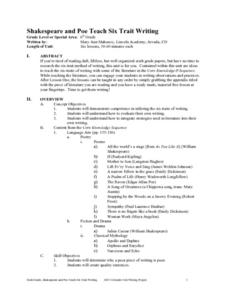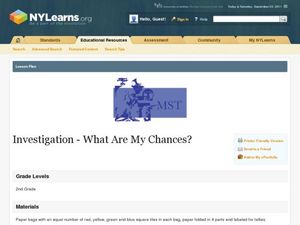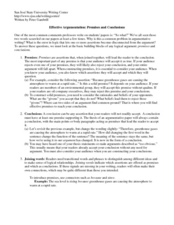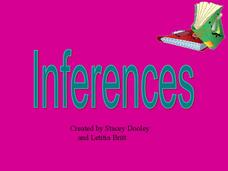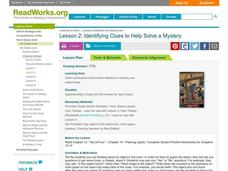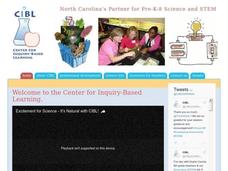Curated OER
Shakespeare and Poe Teach Six-Trait Writing
A Six-Trait Writing instructional activity helps your middle schoolers liven up their word choice and shows them how to evaluate their own writing. Class members take a close look at the language used in poems by Shakespeare, Kipling,...
Curated OER
Read Between the Lines
Build comprehension, inference, and conclusion skills by encouraging learners to see the importance of reading between the lines.
Curated OER
It's A Mystery!: Drawing Conclusions
Using a unique approach, this resource provides clues and a logic problem for learners to solve in order to have them draw conclusions. This would be an interesting and fun way for students to practice reading, and critical thinking skills.
Curated OER
The 5 Paragraph Persuasive Essay
This PowerPoint highlights the steps one should follow to craft an organized essay. It addresses the purpose, audience, and format, and briefly touches on prewriting and organizing. This presentation is designed to review the very basic...
Curated OER
Investigation--What Are My Chances?
Seventh graders investigate theoretical and experimental probability by conducting a series of experiments with multiple trials, comparing results, combining results and making conclusions. They express probabilities as fractions,...
Curated OER
Call It a Hunch
Give young scholars a chance to practice making inferences after reading the book Through My Eyes by Ruby Bridges. They confirm whether or not their conclusions are true, have a class discussion, and then independently complete an...
Curated OER
Lesson 12: What Reasonable Conclusions are Possible?
Oftentimes, we jump to conclusions when we are given a limited amount of information. Take a look at reasonable conclusions with your communications studies class. If-clauses, dichotomous thinking, and assumptions are all covered with...
San José State University
Effective Argumentation: Premises and Conclusions
Augment argumentative skills with this handout and brief exercise. This resource outlines premises, conclusions, and joining words, and explains how these make up the foundation of logical arguments. After reading through this...
Curated OER
Inferences
Inferences are the focus of this short, but effective resource. Students see that when all of the facts are missing in a piece of writing, one has to make an inference - a guess based on what is known. Students practice by considering...
Curated OER
Identifying Clues to Help Solve a Mystery
Sixth graders find clues. In this mystery lesson plan students search for clues within Chasing Vermeer by Blue Balliett to solve the mystery in the story. Students record the details they find.
Curated OER
Conducting a Scientific Investigation
In this scientific investigation worksheet, students answer 16 questions about conducting a scientific experiment on marble's and their velocity at different ramp heights. Students write a scientific question and then go through the...
Curated OER
Germination Inhibitors
In germination experiment worksheet, students conduct the following lab activity. Students determine the effects of another tomato on germinating seeds. Students answer the following questions to analyze their experiment.
Curated OER
Archaeological Inquiry
Young scholars describe what they see as they observe an "artifact". They draw conclusions based on the information gathered to identify what the artifact might be used for and determine how old it might be.
Pennsylvania Department of Education
Analyzing Key Ideas and Details in Nonfiction
Students explore nonfiction texts. In this language arts lesson, students read a nonfiction text and make predictions. Students identify facts and opinions in the text and draw conclusions as they read.
Curated OER
Text Clues and Background Knowledge
Teach youngsters how to evaluate background knowledge, pictures, and context clues to draw a reasonable conclusion about a story. They practice using the discussed clues as they read the story, Alexander and the Terrible, Horrible,...
Curated OER
Story Endings
In this story endings learning exercise, students read six 2-sentence illustrated stories. Students decide if the ending seems logical and write "yes" or "no" under each story.
Curated OER
Story Solutions
Reading and writing are like peanut butter and chocolate, they just work better together. Stimulate those budding authors with a fun worksheet that requires them to read three story starters. The stories have been left incomplete; the...
Curated OER
Science Writing
For this science writing worksheet, students read about the details used in science writing such as facts, observations and conclusions. They answer 5 questions about paragraphs they read and they identify the differences between science...
Curated OER
Parts of Lab Report Review Sheet
In this lab report worksheet, students answer ten questions by filling in a blank with the appropriate letter that corresponds to the part of the lab. Students determine where data goes, where observations go, where answers to discussion...
Curated OER
Where do Plants Get their Food?
In this where do plants get their food worksheet, students design an experiment that will disprove the idea that plants obtain their food from soil. Students will set up their experiment and design a data table that will record data over...
Curated OER
Finding Muffin
In this conclusion worksheet, students read the story about Muffin, the missing dog, and then finish it by writing their own ending.
Curated OER
The Mystery Box
Students work in groups with a wooden box that is sealed shut. They make predictions about what is inside the box. Before being allowed to open the box, the groups make hypotheses, conduct experiements, record results, draw conclusions,...
Curated OER
Introductions and Conclusions
Ninth graders explore the techniques for writing an effective introduction and concluding paragraph in their academic essay. They create an outline of where they plan to take the reader and explore the methods for creating an...
Curated OER
Math in Society
Twelfth graders determine probabilities of real-life events such as life expectancies, winning a lottery ticket and the break-even premium. They apply how life-expectation tables are used to estimate the probability that an individual...


